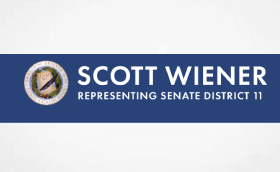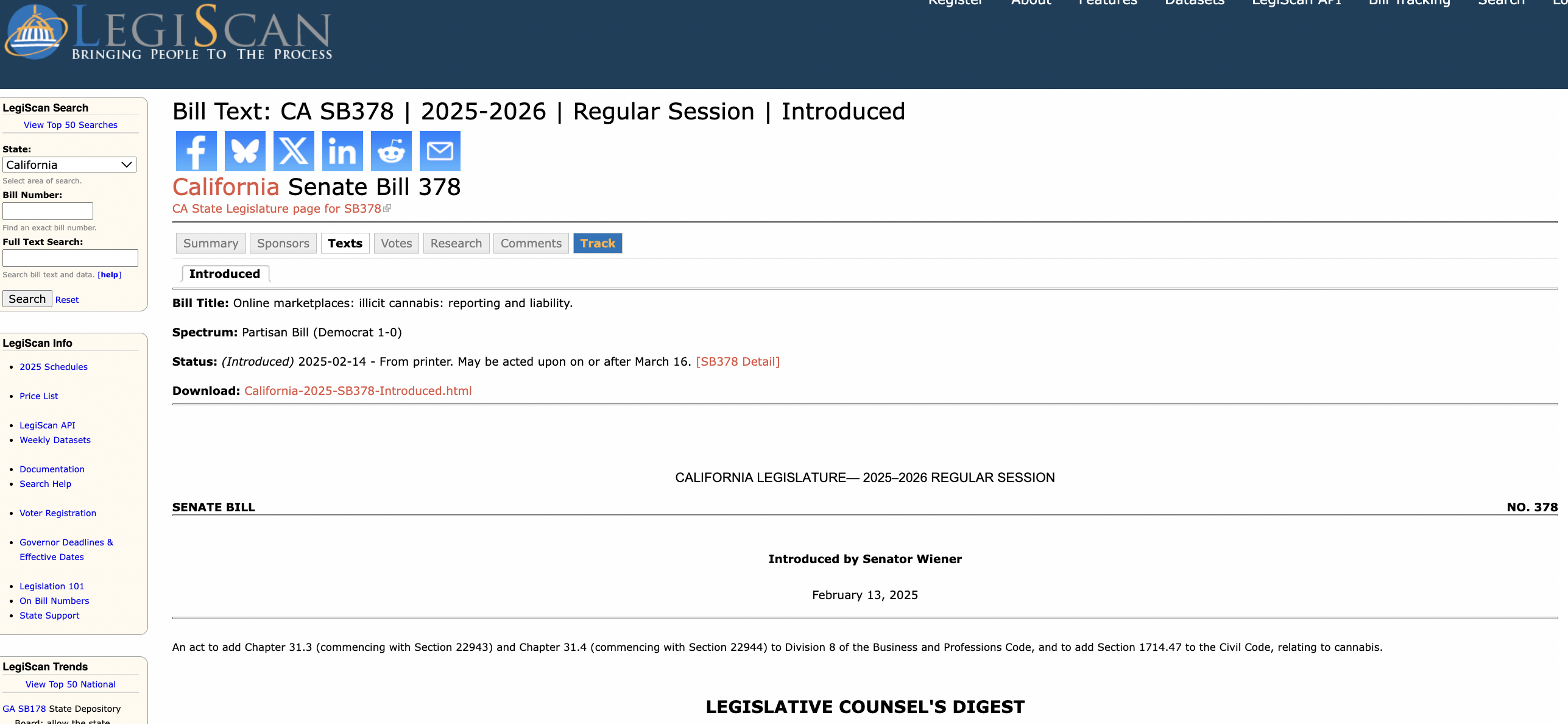SAN FRANCISCO – Senator Scott Wiener (D-San Francisco) introduced SB 378, legislation to prevent online sales of illicit, unlicensed, non-safety-tested intoxicating hemp and cannabis products. While hundreds of licensed dispensaries across California sell legal cannabis products that are safety tested, regulated, and natural, these legal businesses are being undercut by illicit operators selling untested, unregulated hemp and cannabis products through online platforms that do not screen for age. SB 378 will support the legal cannabis industry and protect public health and safety by requiring online platforms to provide a disclaimer if they purvey illicit hemp and cannabis products, and making them strictly liable for harms these products cause consumers.
Though cannabis is strictly regulated in California, federal legalization of industrial hemp has created a loophole that allows many illicit products to skirt California’s safety requirements. Researchers have found that most products marketed as hemp online contain higher levels of THC than the limit for legal cannabis products, and nearly all contain synthetic intoxicants that are illegal under California law and pose significant health risks. Online platforms like Amazon and Instagram do not have effective systems in place to remove these products from online marketplaces, and they face no penalties for blindly selling products that present serious public health risks.
Senator Wiener has long supported cannabis legalization and safe access to it. Senator Wiener has authored various laws to expand access to medical cannabis, to ensure delivery access in areas that lack legal dispensaries, and to reduce taxes on legal cannabis. Senator Wiener has opposed efforts, locally and statewide, to arbitrarily restrict access to legal cannabis. Senator Wiener also has watched with deep concern as California’s legal cannabis industry has struggled in the face of a growing illicit market that doesn’t provide any health or safety protections.
“When Californians voted to legalize cannabis — which I strongly supported — they were not signing up to make sketchy hemp products available to anyone of any age online,” said Senator Wiener. “The sale of illicit hemp and cannabis products that contain alarming levels of THC and synthetic intoxicants undermines the legal cannabis market as well as California’s public health and safety. We can tackle this problem by going after the online platforms that are allowing these products to be sold freely without so much as an age verification requirement. By tackling illicit hemp products, we can support legal cannabis businesses and improve California’s public health and safety.”
Since California legalized cannabis in 2016, a series of challenges have prevented the legal industry from displacing the illicit market. The high safety standards and taxes that legal cannabis businesses face make legal cannabis products significantly more expensive than illicit products. This price gap pushes many consumers to unlicensed sources, fueling the underground market.
“UFCW supported California’s recreational cannabis market because of the stringent testing and protections it would bring to consumers,” said John Frahm, president, UFCW Local 5. “SB 378 will level the playing field between illicit cannabis businesses and legal businesses that has been mismatched for years by ensuring marketplaces advertising illicit cannabis and intoxicating hemp will be held liable. We’re proud to sponsor this important bill to keep consumers and legal cannabis businesses protected.”
Some of the key products that legal cannabis businesses must compete with are marketed as hemp and sold illegally online. The 2018 Farm Bill legalized hemp-derived products in the U.S., but it did not adequately address THC levels in hemp-derived goods. This federal loophole has led to the proliferation of products like Delta-8 THC, which is often synthesized from hemp. These products can be purchased online and shipped across state lines, making them difficult to regulate.
Many products that are marketed as hemp online exceed the maximum levels of THC California law allows in hemp. In a study of over 100 products available online, researchers found that 88% of products failed to meet state hemp standards.
In fact, most hemp products available online contain levels of THC that are dramatically higher than regulations allow in California’s legal cannabis market: Researchers found that the average THC per “hemp” gummy was 89 mg — almost 9 times the per-serving cap in California’s legal cannabis market.
Even more worrying, many illicit hemp products contain synthetic cannabinoids that are far more potent than naturally occurring THC. Roughly half of hemp products available online that were tested by researchers contained THCP, a synthetic cannabinoid that is up to 30 times more potent than naturally occurring THC. This increased potency increases the risk of severe psychological and physiological reactions, including cardiovascular distress, stroke, seizures, and psychosis.
On September 6, 2024, Governor Newsom announced emergency regulations that prohibited the retail sale of hemp food, beverage, and dietary products containing detectable amounts of THC. The emergency regulations were in response to increasing health incidents related to intoxicating hemp products, which state regulators have found sold across the state. The regulations do not ban hemp-derived CBD products with no detectable THC or other intoxicating cannabinoids.
The rise of online platforms has made it easier for illicit cannabis operators to market and sell their products. These platforms do not have effective mechanisms in place to screen for illicit content or to screen purchasers by age. Similarly, search engines often return results for “illicit shops near me,” directing consumers to unlicensed cannabis or hemp retailers. These shops operate outside the scope of state tax systems and product safety regulations, making it difficult for authorities to track and regulate them.
Major online platforms have online dealers running hundreds of paid advertisements on Meta platforms in 2024 to sell illegal opioids, and what appeared to be cocaine and ecstasy pills, according to a report by the Tech Transparency Projects, and federal prosecutors are investigating Meta over the issue.
SB 378 addresses these issues by requiring:
- Enhanced consumer protections by holding an online cannabis or hemp marketplace liable for damages
- Require these online platforms to establish a reporting mechanism to allow individuals to report an unlicensed cannabis product or seller on its site
- Require a disclaimer to the consumer for those online cannabis marketplaces that do not verify a California license of the cannabis sellers prior to displaying products
SB 378 is sponsored by the United Food and Commercial Workers Western States Council, which represents over 5,000 California legal cannabis workers across the supply chain.



















